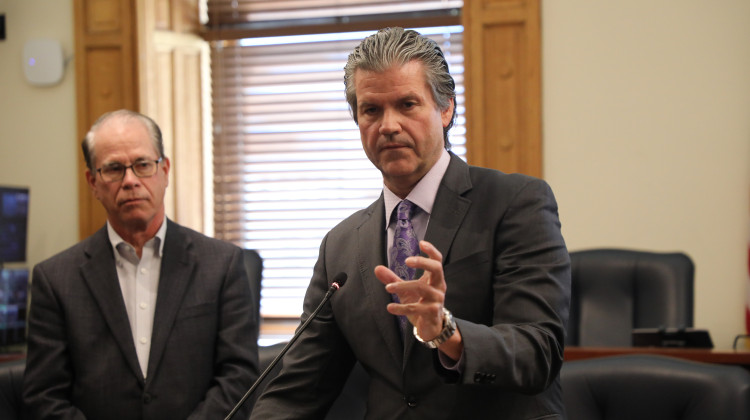The public has weighed in on Indiana’s proposal to add a work requirement to its unique Medicaid program, the Healthy Indiana Plan, or HIP 2.0. More than 40 people submitted their opinions to the federal Centers for Medicare and Medicaid Services as of July 18, showing overwhelming disapproval of the proposal.
Indiana created HIP 2.0 in 2015 under Gov. Mike Pence, expanding Medicaid eligibility to some 270,000 low-income residents. The program already differs from a traditional Medicaid expansion: It asks members to make monthly payments in order to receive benefits. Now, the proposed work requirement would require members to work, train, study or volunteer for up to 20 hours per week, unless they can show they meet certain exemption requirements.
The state submitted its proposal May 25 to the federal Centers for Medicare and Medicaid Services before receiving public comment in Indiana on the measure. Now Hoosiers and local and national health care and advocacy groups are using the federal comment system to voice their concerns.
“This work requirement ignores the reality of life for low-income Hoosiers, and puts another barrier between us and good health,” writes one commenter, who identified as a HIP 2.0 member.
A commonly raised concern is that a work requirement would create new administrative hurdles for HIP 2.0 members. Members would either have to show that they are satisfying the requirement, or prove they’re exempt. If they fail to meet the state’s criteria, they risk having their coverage suspended.
“It's common knowledge in social services that navigating health care in Indiana is a part time job in and of itself,” wrote one commenter. “Creating another hoop for people to jump through just makes an already difficult system to navigate even more difficult.”
Previous reports about the program have shown people have trouble signing up and maintaining HIP 2.0 coverage, partly because of the required monthly payments. Some have been kicked out of the program even when they made their payments on time. A number of commenters used the opportunity to reiterate concerns over HIP 2.0’s required payments.
Several national nonprofits, including the American Congress of Obstetricians and Gynecologists (ACOG), American Diabetes Association and National Alliance on Mental Illness, say a work requirement could make it harder for low-income people to maintain coverage.
“It’s another place where a person may get tripped up, and may fall through the cracks,” says Adam Mueller, advocacy director for Indiana Legal Services, a pro-bono law group which posted a comment. He says that’s a real problem for people with mental and physical health issues. “If they lose coverage ... they’re gonna have a real downward slide at that point.
Some commenters even got a little heated.
“I am ashamed to be a Republican when I see this sort of ungodly policy being floated out as a 'good' idea,” wrote another commenter. “We will waste millions of dollars on this...”
Financial concerns were mentioned repeatedly in the comments posted online.
“To create more obstacles for the already vulnerable members of our society is immoral,” writes Heather Maritano, a licensed clinical social worker in Bloomington, Ind. “But as most policy is based on economics - let me appeal to the bottom dollar: It costs everyone more money when health care coverage is reduced!
Saint Joseph Health System, located in northern Indiana, warned that suspending coverage “can create disruptions in care leading to unnecessary readmissions, poor care transitions, or potentially duplication of services as individuals re-enroll—all of which could increase program costs.”
The state’s analysis shows that under the proposed changes, HIP 2.0 will cost more and cover fewer people, which was cited by a number of comments submitted to CMS. Adding to that cost, Mueller argues, would come from the need to track work activities and exemptions for thousands of HIP 2.0 members.
“That’s going to be pretty burdensome to administer in an effective way,” he says.
A number of commenters say the work requirement wouldn’t do much to drive employment, because many Medicaid recipients are already working. “Nearly eight in ten non-disabled adults with Medicaid coverage live in working families, and nearly 60 percent are working themselves,” writes Haywood Brown, president of ACOG. “Of those not working, more than one-third reported that illness or a disability was the primary reason, 28 percent reported that they were taking care of home or family, and 18 percent were in school.”
Some argue that Medicaid is not a jobs program, and that the responsibility of helping people find and keep jobs should fall to other parts of the state government.
And a few wrote that by submitting the Indiana’s proposal before the comment period was over, the state ignored the input of its citizens: “It would be quite troublesome if our input and that of all the stakeholders representing Indiana residents is not thoughtfully considered before the state moves forward with its proposals and CMS moves forward with its review,” writes LaShawn McIver, who heads advocacy at the American Diabetes Association.
Indiana’s Family and Social Services Administration did not respond to requests for comment for this piece.
As of July 18, 43 comments had been submitted, including one duplicate and one consisting of unreadable text. Only one comment was supportive of the work requirement.
This story was produced by Side Effects Public Media, a news collaborative covering public health.
 DONATE
DONATE










 Support WFYI. We can't do it without you.
Support WFYI. We can't do it without you.